Psychology Report: Framework, IPA, and Discourse Analysis Comparison
VerifiedAdded on 2022/08/27
|8
|2102
|36
Report
AI Summary
This report delves into three key qualitative analysis techniques used in psychology: Framework Analysis, Interpretative Phenomenological Analysis (IPA), and Discourse Analysis. Framework Analysis, a structured approach, is used to manage and analyze qualitative data, often in health research, following a seven-stage process including transcription, coding, and interpretation. IPA, a more philosophical method, aims to understand how individuals make sense of specific phenomena, focusing on individual experiences. The report highlights that IPA studies often involve in-depth examination of the experiences of a small number of participants. Discourse analysis, on the other hand, examines psychological themes within talk, texts, and images, using techniques such as speech act theory and ethnography of communication. The report explores the data collection methods, similarities, and differences between these techniques, emphasizing their importance in psychological studies. The report also gives examples of how these methods are used in different areas of psychological research, such as the analysis of women's health issues.

Running head: PSYCHOLOGY
Psychology
Name of the Student
Name of the University
Author Note
Psychology
Name of the Student
Name of the University
Author Note
Paraphrase This Document
Need a fresh take? Get an instant paraphrase of this document with our AI Paraphraser
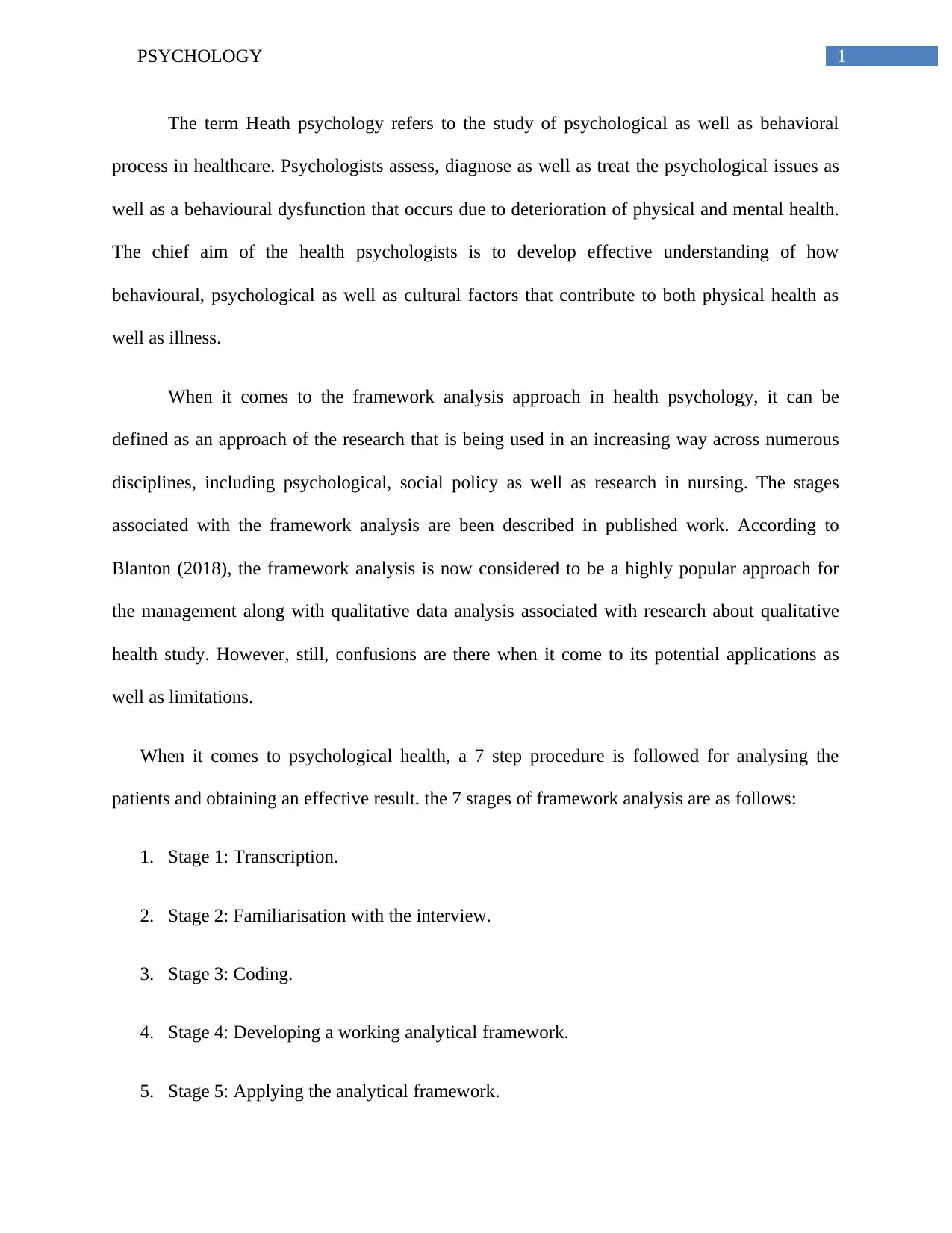
1PSYCHOLOGY
The term Heath psychology refers to the study of psychological as well as behavioral
process in healthcare. Psychologists assess, diagnose as well as treat the psychological issues as
well as a behavioural dysfunction that occurs due to deterioration of physical and mental health.
The chief aim of the health psychologists is to develop effective understanding of how
behavioural, psychological as well as cultural factors that contribute to both physical health as
well as illness.
When it comes to the framework analysis approach in health psychology, it can be
defined as an approach of the research that is being used in an increasing way across numerous
disciplines, including psychological, social policy as well as research in nursing. The stages
associated with the framework analysis are been described in published work. According to
Blanton (2018), the framework analysis is now considered to be a highly popular approach for
the management along with qualitative data analysis associated with research about qualitative
health study. However, still, confusions are there when it come to its potential applications as
well as limitations.
When it comes to psychological health, a 7 step procedure is followed for analysing the
patients and obtaining an effective result. the 7 stages of framework analysis are as follows:
1. Stage 1: Transcription.
2. Stage 2: Familiarisation with the interview.
3. Stage 3: Coding.
4. Stage 4: Developing a working analytical framework.
5. Stage 5: Applying the analytical framework.
The term Heath psychology refers to the study of psychological as well as behavioral
process in healthcare. Psychologists assess, diagnose as well as treat the psychological issues as
well as a behavioural dysfunction that occurs due to deterioration of physical and mental health.
The chief aim of the health psychologists is to develop effective understanding of how
behavioural, psychological as well as cultural factors that contribute to both physical health as
well as illness.
When it comes to the framework analysis approach in health psychology, it can be
defined as an approach of the research that is being used in an increasing way across numerous
disciplines, including psychological, social policy as well as research in nursing. The stages
associated with the framework analysis are been described in published work. According to
Blanton (2018), the framework analysis is now considered to be a highly popular approach for
the management along with qualitative data analysis associated with research about qualitative
health study. However, still, confusions are there when it come to its potential applications as
well as limitations.
When it comes to psychological health, a 7 step procedure is followed for analysing the
patients and obtaining an effective result. the 7 stages of framework analysis are as follows:
1. Stage 1: Transcription.
2. Stage 2: Familiarisation with the interview.
3. Stage 3: Coding.
4. Stage 4: Developing a working analytical framework.
5. Stage 5: Applying the analytical framework.
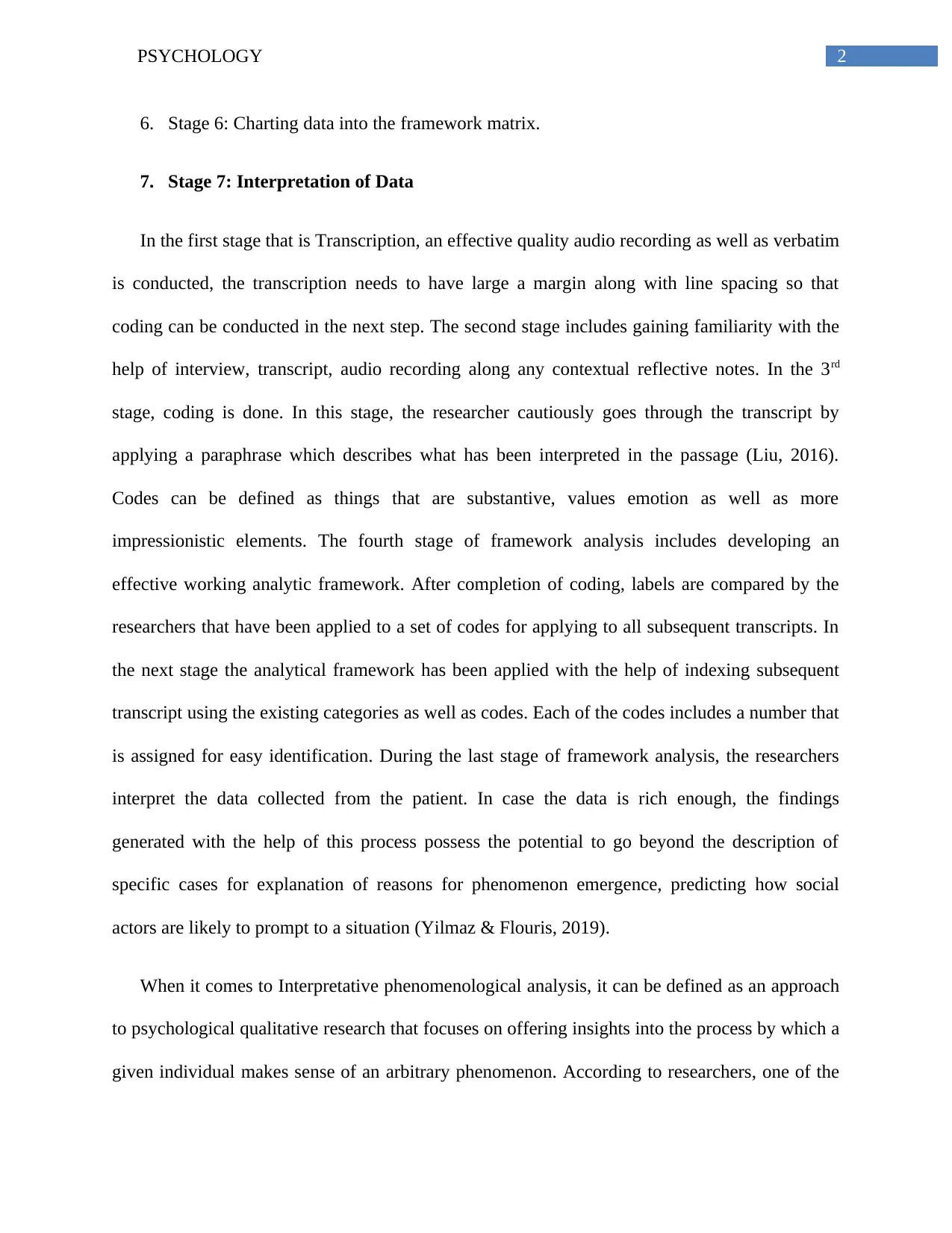
2PSYCHOLOGY
6. Stage 6: Charting data into the framework matrix.
7. Stage 7: Interpretation of Data
In the first stage that is Transcription, an effective quality audio recording as well as verbatim
is conducted, the transcription needs to have large a margin along with line spacing so that
coding can be conducted in the next step. The second stage includes gaining familiarity with the
help of interview, transcript, audio recording along any contextual reflective notes. In the 3rd
stage, coding is done. In this stage, the researcher cautiously goes through the transcript by
applying a paraphrase which describes what has been interpreted in the passage (Liu, 2016).
Codes can be defined as things that are substantive, values emotion as well as more
impressionistic elements. The fourth stage of framework analysis includes developing an
effective working analytic framework. After completion of coding, labels are compared by the
researchers that have been applied to a set of codes for applying to all subsequent transcripts. In
the next stage the analytical framework has been applied with the help of indexing subsequent
transcript using the existing categories as well as codes. Each of the codes includes a number that
is assigned for easy identification. During the last stage of framework analysis, the researchers
interpret the data collected from the patient. In case the data is rich enough, the findings
generated with the help of this process possess the potential to go beyond the description of
specific cases for explanation of reasons for phenomenon emergence, predicting how social
actors are likely to prompt to a situation (Yilmaz & Flouris, 2019).
When it comes to Interpretative phenomenological analysis, it can be defined as an approach
to psychological qualitative research that focuses on offering insights into the process by which a
given individual makes sense of an arbitrary phenomenon. According to researchers, one of the
6. Stage 6: Charting data into the framework matrix.
7. Stage 7: Interpretation of Data
In the first stage that is Transcription, an effective quality audio recording as well as verbatim
is conducted, the transcription needs to have large a margin along with line spacing so that
coding can be conducted in the next step. The second stage includes gaining familiarity with the
help of interview, transcript, audio recording along any contextual reflective notes. In the 3rd
stage, coding is done. In this stage, the researcher cautiously goes through the transcript by
applying a paraphrase which describes what has been interpreted in the passage (Liu, 2016).
Codes can be defined as things that are substantive, values emotion as well as more
impressionistic elements. The fourth stage of framework analysis includes developing an
effective working analytic framework. After completion of coding, labels are compared by the
researchers that have been applied to a set of codes for applying to all subsequent transcripts. In
the next stage the analytical framework has been applied with the help of indexing subsequent
transcript using the existing categories as well as codes. Each of the codes includes a number that
is assigned for easy identification. During the last stage of framework analysis, the researchers
interpret the data collected from the patient. In case the data is rich enough, the findings
generated with the help of this process possess the potential to go beyond the description of
specific cases for explanation of reasons for phenomenon emergence, predicting how social
actors are likely to prompt to a situation (Yilmaz & Flouris, 2019).
When it comes to Interpretative phenomenological analysis, it can be defined as an approach
to psychological qualitative research that focuses on offering insights into the process by which a
given individual makes sense of an arbitrary phenomenon. According to researchers, one of the
⊘ This is a preview!⊘
Do you want full access?
Subscribe today to unlock all pages.

Trusted by 1+ million students worldwide
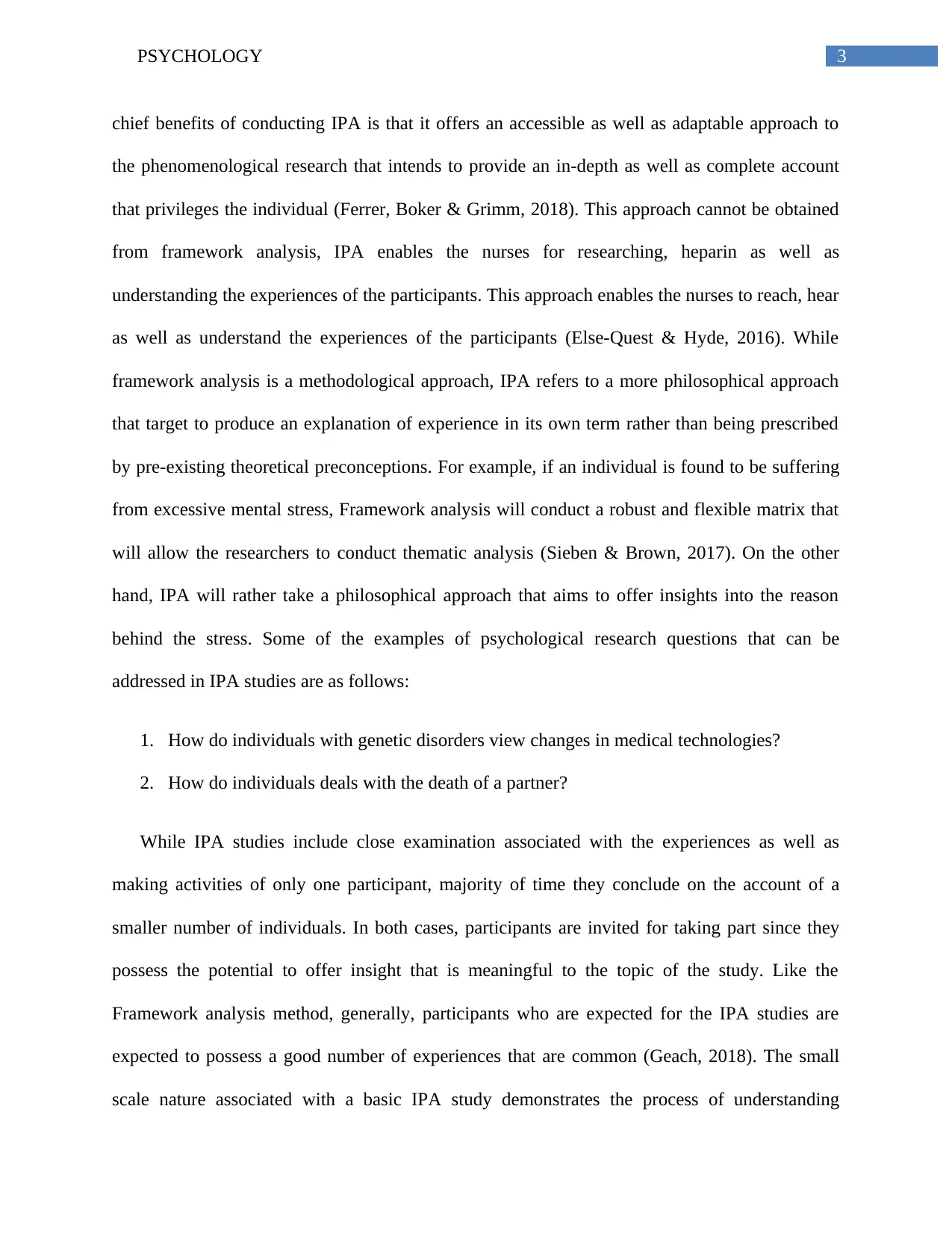
3PSYCHOLOGY
chief benefits of conducting IPA is that it offers an accessible as well as adaptable approach to
the phenomenological research that intends to provide an in-depth as well as complete account
that privileges the individual (Ferrer, Boker & Grimm, 2018). This approach cannot be obtained
from framework analysis, IPA enables the nurses for researching, heparin as well as
understanding the experiences of the participants. This approach enables the nurses to reach, hear
as well as understand the experiences of the participants (Else-Quest & Hyde, 2016). While
framework analysis is a methodological approach, IPA refers to a more philosophical approach
that target to produce an explanation of experience in its own term rather than being prescribed
by pre-existing theoretical preconceptions. For example, if an individual is found to be suffering
from excessive mental stress, Framework analysis will conduct a robust and flexible matrix that
will allow the researchers to conduct thematic analysis (Sieben & Brown, 2017). On the other
hand, IPA will rather take a philosophical approach that aims to offer insights into the reason
behind the stress. Some of the examples of psychological research questions that can be
addressed in IPA studies are as follows:
1. How do individuals with genetic disorders view changes in medical technologies?
2. How do individuals deals with the death of a partner?
While IPA studies include close examination associated with the experiences as well as
making activities of only one participant, majority of time they conclude on the account of a
smaller number of individuals. In both cases, participants are invited for taking part since they
possess the potential to offer insight that is meaningful to the topic of the study. Like the
Framework analysis method, generally, participants who are expected for the IPA studies are
expected to possess a good number of experiences that are common (Geach, 2018). The small
scale nature associated with a basic IPA study demonstrates the process of understanding
chief benefits of conducting IPA is that it offers an accessible as well as adaptable approach to
the phenomenological research that intends to provide an in-depth as well as complete account
that privileges the individual (Ferrer, Boker & Grimm, 2018). This approach cannot be obtained
from framework analysis, IPA enables the nurses for researching, heparin as well as
understanding the experiences of the participants. This approach enables the nurses to reach, hear
as well as understand the experiences of the participants (Else-Quest & Hyde, 2016). While
framework analysis is a methodological approach, IPA refers to a more philosophical approach
that target to produce an explanation of experience in its own term rather than being prescribed
by pre-existing theoretical preconceptions. For example, if an individual is found to be suffering
from excessive mental stress, Framework analysis will conduct a robust and flexible matrix that
will allow the researchers to conduct thematic analysis (Sieben & Brown, 2017). On the other
hand, IPA will rather take a philosophical approach that aims to offer insights into the reason
behind the stress. Some of the examples of psychological research questions that can be
addressed in IPA studies are as follows:
1. How do individuals with genetic disorders view changes in medical technologies?
2. How do individuals deals with the death of a partner?
While IPA studies include close examination associated with the experiences as well as
making activities of only one participant, majority of time they conclude on the account of a
smaller number of individuals. In both cases, participants are invited for taking part since they
possess the potential to offer insight that is meaningful to the topic of the study. Like the
Framework analysis method, generally, participants who are expected for the IPA studies are
expected to possess a good number of experiences that are common (Geach, 2018). The small
scale nature associated with a basic IPA study demonstrates the process of understanding
Paraphrase This Document
Need a fresh take? Get an instant paraphrase of this document with our AI Paraphraser
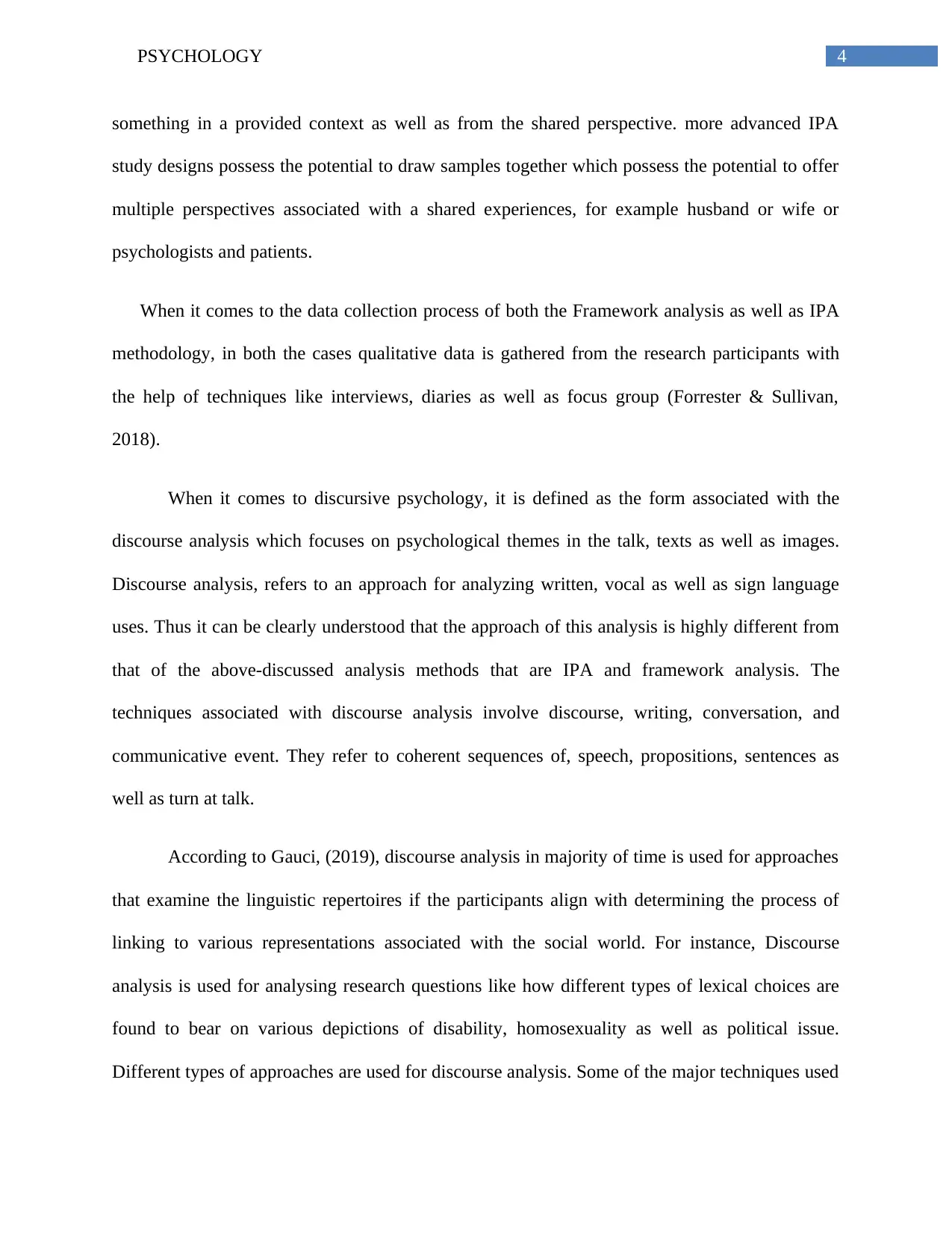
4PSYCHOLOGY
something in a provided context as well as from the shared perspective. more advanced IPA
study designs possess the potential to draw samples together which possess the potential to offer
multiple perspectives associated with a shared experiences, for example husband or wife or
psychologists and patients.
When it comes to the data collection process of both the Framework analysis as well as IPA
methodology, in both the cases qualitative data is gathered from the research participants with
the help of techniques like interviews, diaries as well as focus group (Forrester & Sullivan,
2018).
When it comes to discursive psychology, it is defined as the form associated with the
discourse analysis which focuses on psychological themes in the talk, texts as well as images.
Discourse analysis, refers to an approach for analyzing written, vocal as well as sign language
uses. Thus it can be clearly understood that the approach of this analysis is highly different from
that of the above-discussed analysis methods that are IPA and framework analysis. The
techniques associated with discourse analysis involve discourse, writing, conversation, and
communicative event. They refer to coherent sequences of, speech, propositions, sentences as
well as turn at talk.
According to Gauci, (2019), discourse analysis in majority of time is used for approaches
that examine the linguistic repertoires if the participants align with determining the process of
linking to various representations associated with the social world. For instance, Discourse
analysis is used for analysing research questions like how different types of lexical choices are
found to bear on various depictions of disability, homosexuality as well as political issue.
Different types of approaches are used for discourse analysis. Some of the major techniques used
something in a provided context as well as from the shared perspective. more advanced IPA
study designs possess the potential to draw samples together which possess the potential to offer
multiple perspectives associated with a shared experiences, for example husband or wife or
psychologists and patients.
When it comes to the data collection process of both the Framework analysis as well as IPA
methodology, in both the cases qualitative data is gathered from the research participants with
the help of techniques like interviews, diaries as well as focus group (Forrester & Sullivan,
2018).
When it comes to discursive psychology, it is defined as the form associated with the
discourse analysis which focuses on psychological themes in the talk, texts as well as images.
Discourse analysis, refers to an approach for analyzing written, vocal as well as sign language
uses. Thus it can be clearly understood that the approach of this analysis is highly different from
that of the above-discussed analysis methods that are IPA and framework analysis. The
techniques associated with discourse analysis involve discourse, writing, conversation, and
communicative event. They refer to coherent sequences of, speech, propositions, sentences as
well as turn at talk.
According to Gauci, (2019), discourse analysis in majority of time is used for approaches
that examine the linguistic repertoires if the participants align with determining the process of
linking to various representations associated with the social world. For instance, Discourse
analysis is used for analysing research questions like how different types of lexical choices are
found to bear on various depictions of disability, homosexuality as well as political issue.
Different types of approaches are used for discourse analysis. Some of the major techniques used
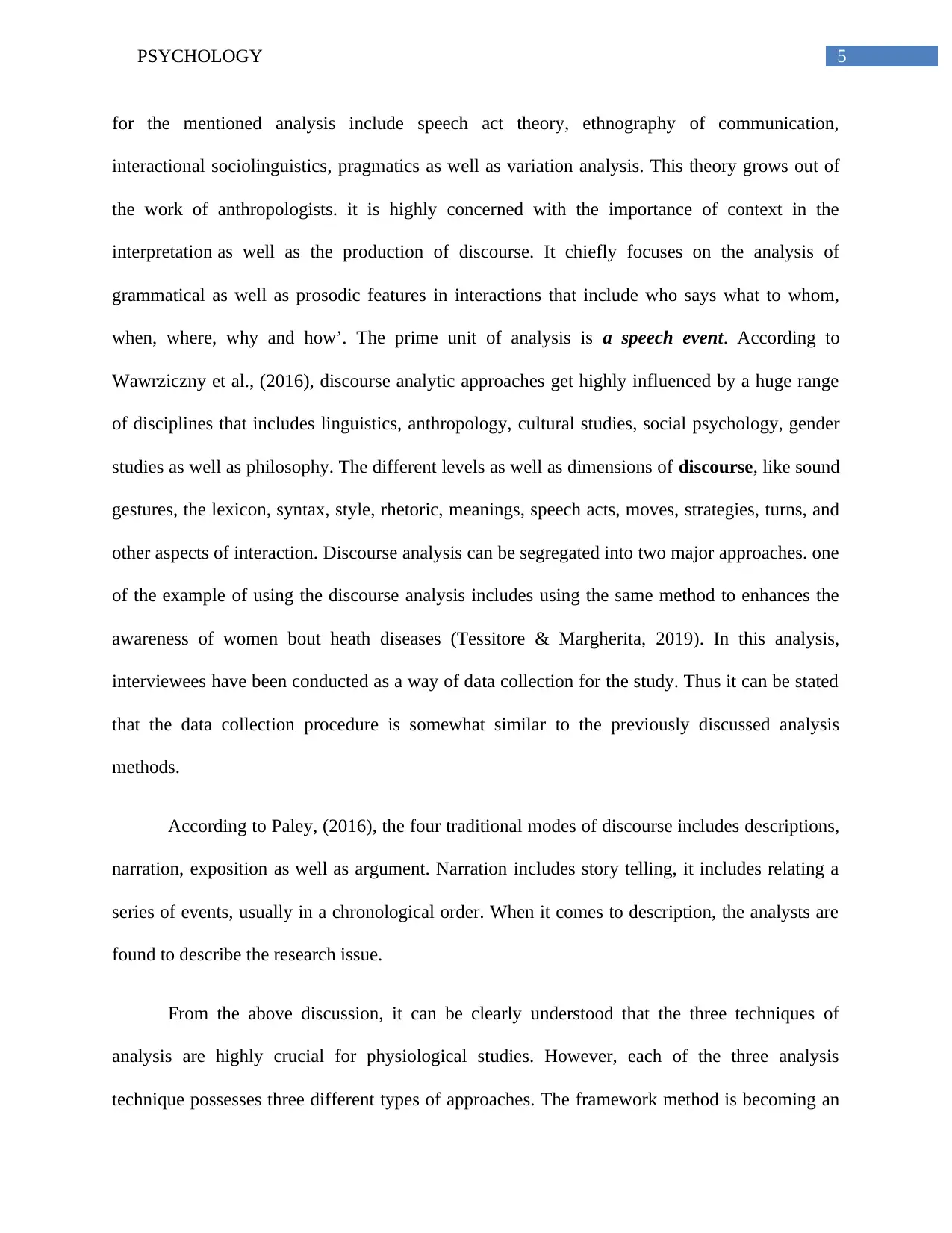
5PSYCHOLOGY
for the mentioned analysis include speech act theory, ethnography of communication,
interactional sociolinguistics, pragmatics as well as variation analysis. This theory grows out of
the work of anthropologists. it is highly concerned with the importance of context in the
interpretation as well as the production of discourse. It chiefly focuses on the analysis of
grammatical as well as prosodic features in interactions that include who says what to whom,
when, where, why and how’. The prime unit of analysis is a speech event. According to
Wawrziczny et al., (2016), discourse analytic approaches get highly influenced by a huge range
of disciplines that includes linguistics, anthropology, cultural studies, social psychology, gender
studies as well as philosophy. The different levels as well as dimensions of discourse, like sound
gestures, the lexicon, syntax, style, rhetoric, meanings, speech acts, moves, strategies, turns, and
other aspects of interaction. Discourse analysis can be segregated into two major approaches. one
of the example of using the discourse analysis includes using the same method to enhances the
awareness of women bout heath diseases (Tessitore & Margherita, 2019). In this analysis,
interviewees have been conducted as a way of data collection for the study. Thus it can be stated
that the data collection procedure is somewhat similar to the previously discussed analysis
methods.
According to Paley, (2016), the four traditional modes of discourse includes descriptions,
narration, exposition as well as argument. Narration includes story telling, it includes relating a
series of events, usually in a chronological order. When it comes to description, the analysts are
found to describe the research issue.
From the above discussion, it can be clearly understood that the three techniques of
analysis are highly crucial for physiological studies. However, each of the three analysis
technique possesses three different types of approaches. The framework method is becoming an
for the mentioned analysis include speech act theory, ethnography of communication,
interactional sociolinguistics, pragmatics as well as variation analysis. This theory grows out of
the work of anthropologists. it is highly concerned with the importance of context in the
interpretation as well as the production of discourse. It chiefly focuses on the analysis of
grammatical as well as prosodic features in interactions that include who says what to whom,
when, where, why and how’. The prime unit of analysis is a speech event. According to
Wawrziczny et al., (2016), discourse analytic approaches get highly influenced by a huge range
of disciplines that includes linguistics, anthropology, cultural studies, social psychology, gender
studies as well as philosophy. The different levels as well as dimensions of discourse, like sound
gestures, the lexicon, syntax, style, rhetoric, meanings, speech acts, moves, strategies, turns, and
other aspects of interaction. Discourse analysis can be segregated into two major approaches. one
of the example of using the discourse analysis includes using the same method to enhances the
awareness of women bout heath diseases (Tessitore & Margherita, 2019). In this analysis,
interviewees have been conducted as a way of data collection for the study. Thus it can be stated
that the data collection procedure is somewhat similar to the previously discussed analysis
methods.
According to Paley, (2016), the four traditional modes of discourse includes descriptions,
narration, exposition as well as argument. Narration includes story telling, it includes relating a
series of events, usually in a chronological order. When it comes to description, the analysts are
found to describe the research issue.
From the above discussion, it can be clearly understood that the three techniques of
analysis are highly crucial for physiological studies. However, each of the three analysis
technique possesses three different types of approaches. The framework method is becoming an
⊘ This is a preview!⊘
Do you want full access?
Subscribe today to unlock all pages.

Trusted by 1+ million students worldwide
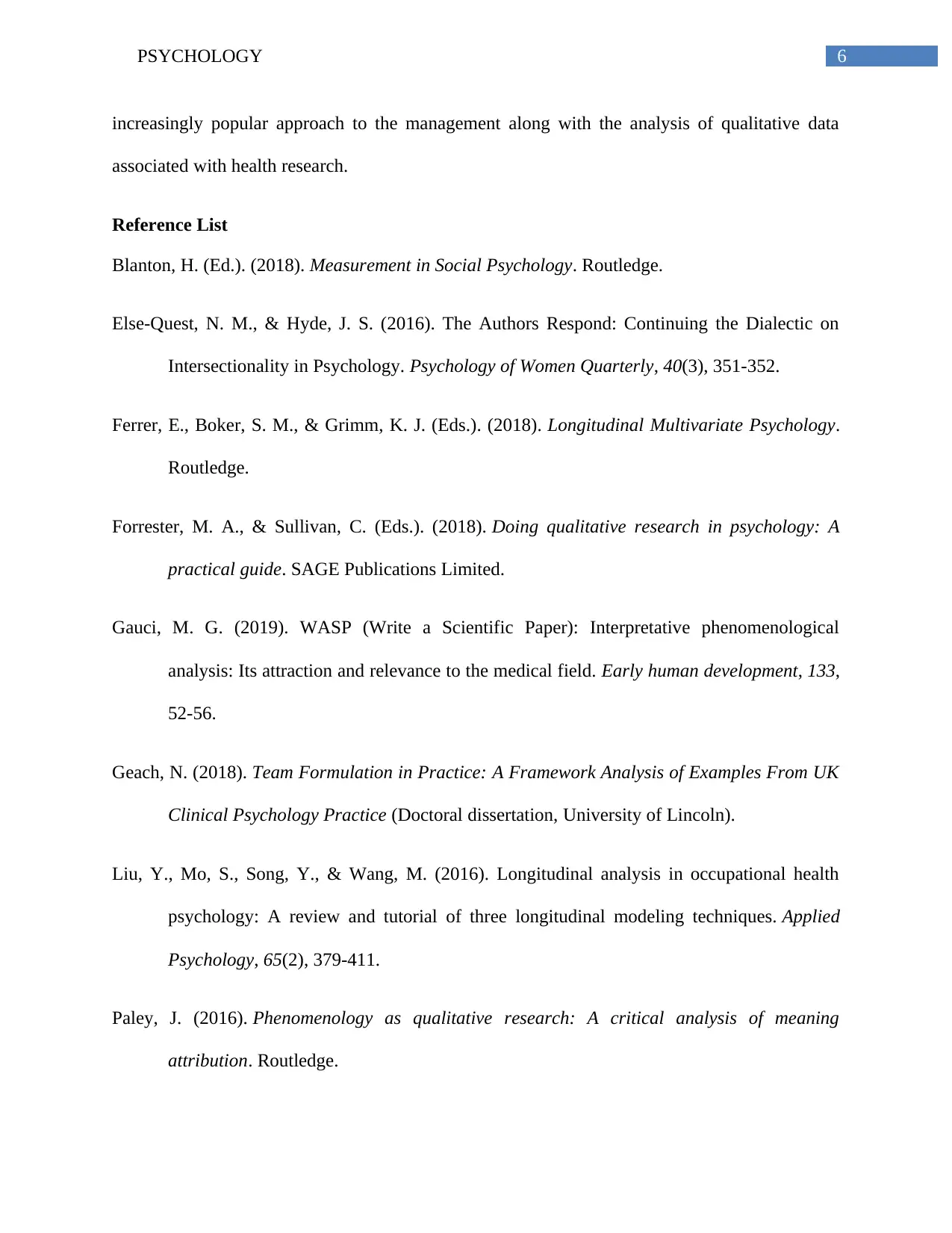
6PSYCHOLOGY
increasingly popular approach to the management along with the analysis of qualitative data
associated with health research.
Reference List
Blanton, H. (Ed.). (2018). Measurement in Social Psychology. Routledge.
Else-Quest, N. M., & Hyde, J. S. (2016). The Authors Respond: Continuing the Dialectic on
Intersectionality in Psychology. Psychology of Women Quarterly, 40(3), 351-352.
Ferrer, E., Boker, S. M., & Grimm, K. J. (Eds.). (2018). Longitudinal Multivariate Psychology.
Routledge.
Forrester, M. A., & Sullivan, C. (Eds.). (2018). Doing qualitative research in psychology: A
practical guide. SAGE Publications Limited.
Gauci, M. G. (2019). WASP (Write a Scientific Paper): Interpretative phenomenological
analysis: Its attraction and relevance to the medical field. Early human development, 133,
52-56.
Geach, N. (2018). Team Formulation in Practice: A Framework Analysis of Examples From UK
Clinical Psychology Practice (Doctoral dissertation, University of Lincoln).
Liu, Y., Mo, S., Song, Y., & Wang, M. (2016). Longitudinal analysis in occupational health
psychology: A review and tutorial of three longitudinal modeling techniques. Applied
Psychology, 65(2), 379-411.
Paley, J. (2016). Phenomenology as qualitative research: A critical analysis of meaning
attribution. Routledge.
increasingly popular approach to the management along with the analysis of qualitative data
associated with health research.
Reference List
Blanton, H. (Ed.). (2018). Measurement in Social Psychology. Routledge.
Else-Quest, N. M., & Hyde, J. S. (2016). The Authors Respond: Continuing the Dialectic on
Intersectionality in Psychology. Psychology of Women Quarterly, 40(3), 351-352.
Ferrer, E., Boker, S. M., & Grimm, K. J. (Eds.). (2018). Longitudinal Multivariate Psychology.
Routledge.
Forrester, M. A., & Sullivan, C. (Eds.). (2018). Doing qualitative research in psychology: A
practical guide. SAGE Publications Limited.
Gauci, M. G. (2019). WASP (Write a Scientific Paper): Interpretative phenomenological
analysis: Its attraction and relevance to the medical field. Early human development, 133,
52-56.
Geach, N. (2018). Team Formulation in Practice: A Framework Analysis of Examples From UK
Clinical Psychology Practice (Doctoral dissertation, University of Lincoln).
Liu, Y., Mo, S., Song, Y., & Wang, M. (2016). Longitudinal analysis in occupational health
psychology: A review and tutorial of three longitudinal modeling techniques. Applied
Psychology, 65(2), 379-411.
Paley, J. (2016). Phenomenology as qualitative research: A critical analysis of meaning
attribution. Routledge.
Paraphrase This Document
Need a fresh take? Get an instant paraphrase of this document with our AI Paraphraser
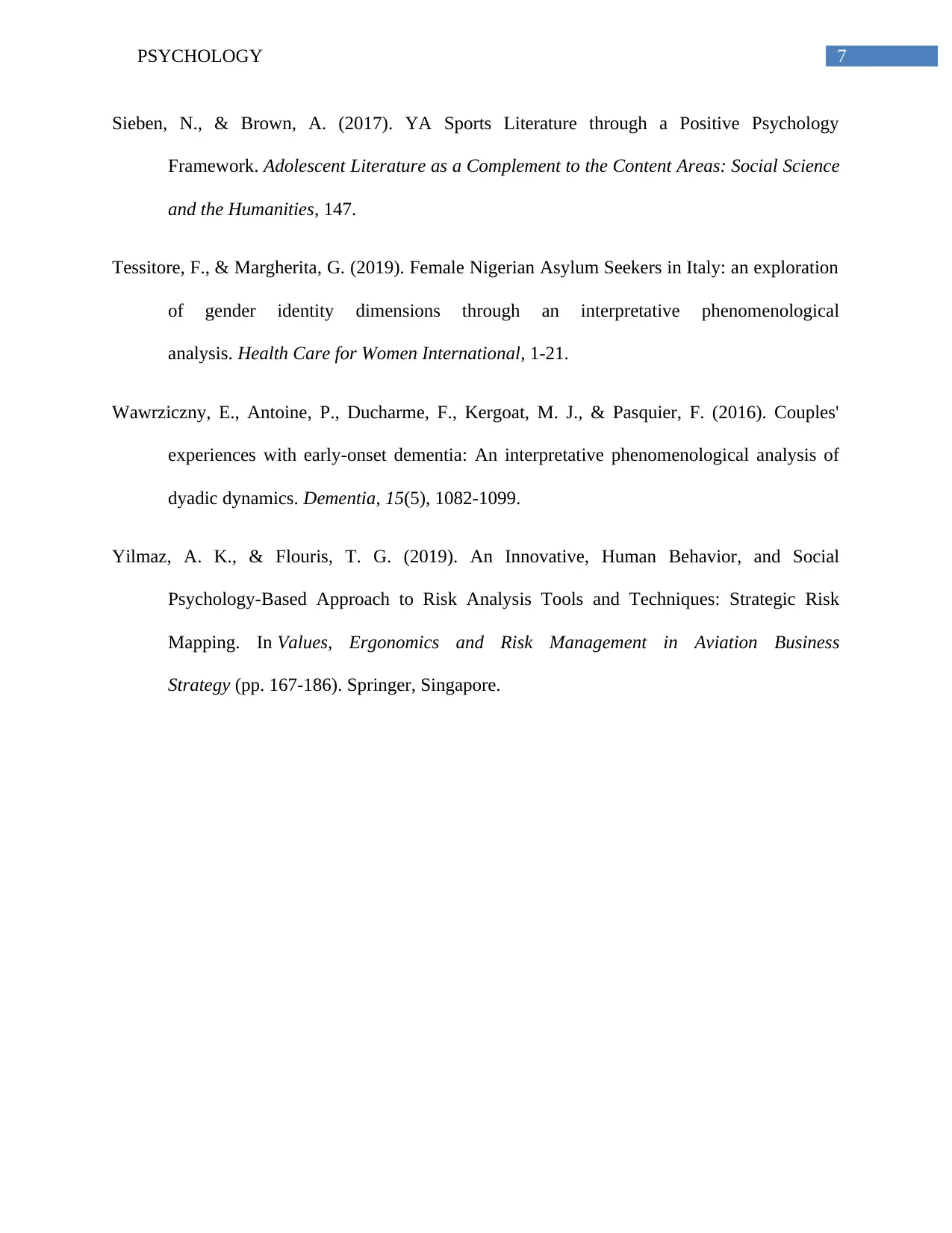
7PSYCHOLOGY
Sieben, N., & Brown, A. (2017). YA Sports Literature through a Positive Psychology
Framework. Adolescent Literature as a Complement to the Content Areas: Social Science
and the Humanities, 147.
Tessitore, F., & Margherita, G. (2019). Female Nigerian Asylum Seekers in Italy: an exploration
of gender identity dimensions through an interpretative phenomenological
analysis. Health Care for Women International, 1-21.
Wawrziczny, E., Antoine, P., Ducharme, F., Kergoat, M. J., & Pasquier, F. (2016). Couples'
experiences with early-onset dementia: An interpretative phenomenological analysis of
dyadic dynamics. Dementia, 15(5), 1082-1099.
Yilmaz, A. K., & Flouris, T. G. (2019). An Innovative, Human Behavior, and Social
Psychology-Based Approach to Risk Analysis Tools and Techniques: Strategic Risk
Mapping. In Values, Ergonomics and Risk Management in Aviation Business
Strategy (pp. 167-186). Springer, Singapore.
Sieben, N., & Brown, A. (2017). YA Sports Literature through a Positive Psychology
Framework. Adolescent Literature as a Complement to the Content Areas: Social Science
and the Humanities, 147.
Tessitore, F., & Margherita, G. (2019). Female Nigerian Asylum Seekers in Italy: an exploration
of gender identity dimensions through an interpretative phenomenological
analysis. Health Care for Women International, 1-21.
Wawrziczny, E., Antoine, P., Ducharme, F., Kergoat, M. J., & Pasquier, F. (2016). Couples'
experiences with early-onset dementia: An interpretative phenomenological analysis of
dyadic dynamics. Dementia, 15(5), 1082-1099.
Yilmaz, A. K., & Flouris, T. G. (2019). An Innovative, Human Behavior, and Social
Psychology-Based Approach to Risk Analysis Tools and Techniques: Strategic Risk
Mapping. In Values, Ergonomics and Risk Management in Aviation Business
Strategy (pp. 167-186). Springer, Singapore.
1 out of 8
Related Documents
Your All-in-One AI-Powered Toolkit for Academic Success.
+13062052269
info@desklib.com
Available 24*7 on WhatsApp / Email
![[object Object]](/_next/static/media/star-bottom.7253800d.svg)
Unlock your academic potential
Copyright © 2020–2026 A2Z Services. All Rights Reserved. Developed and managed by ZUCOL.





